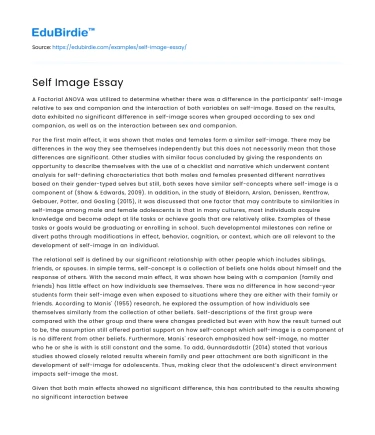A Factorial ANOVA was utilized to determine whether there was a difference in the participants’ self-image relative to sex and companion and the interaction of both variables on self-image. Based on the results, data exhibited no significant difference in self-image scores when grouped according to sex and companion, as well as on the interaction between sex and companion.
For the first main effect, it was shown that males and females form a similar self-image. There may be differences in the way they see themselves independently but this does not necessarily mean that those differences are significant. Other studies with similar focus concluded by giving the respondents an opportunity to describe themselves with the use of a checklist and narrative which underwent content analysis for self-defining characteristics that both males and females presented different narratives based on their gender-typed selves but still, both sexes have similar self-concepts where self-image is a component of (Shaw & Edwards, 2009). In addition, in the study of Bleidorn, Arslan, Denissen, Rentfrow, Gebauer, Potter, and Gosling (2015), it was discussed that one factor that may contribute to similarities in self-image among male and female adolescents is that in many cultures, most individuals acquire knowledge and become adept at life tasks or achieve goals that are relatively alike. Examples of these tasks or goals would be graduating or enrolling in school. Such developmental milestones can refine or divert paths through modifications in effect, behavior, cognition, or context, which are all relevant to the development of self-image in an individual.
Save your time!
We can take care of your essay
- Proper editing and formatting
- Free revision, title page, and bibliography
- Flexible prices and money-back guarantee
The relational self is defined by our significant relationship with other people which includes siblings, friends, or spouses. In simple terms, self-concept is a collection of beliefs one holds about himself and the response of others. With the second main effect, it was shown how being with a companion (family and friends) has little effect on how individuals see themselves. There was no difference in how second-year students form their self-image even when exposed to situations where they are either with their family or friends. According to Manis' (1955) research, he explored the assumption of how individuals see themselves similarly from the collection of other beliefs. Self-descriptions of the first group were compared with the other group and there were changes predicted but even with how the result turned out to be, the assumption still offered partial support on how self-concept which self-image is a component of is no different from other beliefs. Furthermore, Manis' research emphasized how self-image, no matter who he or she is with is still constant and the same. To add, Gunnardsdottir (2014) stated that various studies showed closely related results wherein family and peer attachment are both significant in the development of self-image for adolescents. Thus, making clear that the adolescent’s direct environment impacts self-image the most.
Given that both main effects showed no significant difference, this has contributed to the results showing no significant interaction between sex and companionship on self-image. This can be supported by the study of Gunnardsdottir (2014) which stated that both family and peers are equally significant and have a closely similar impact on the self-image of an adolescent individual. It was also highlighted in the study that although female adolescents recognized more peer support compared to male adolescents, the results still manifested no difference in self-image relative to sex.






 Stuck on your essay?
Stuck on your essay?

